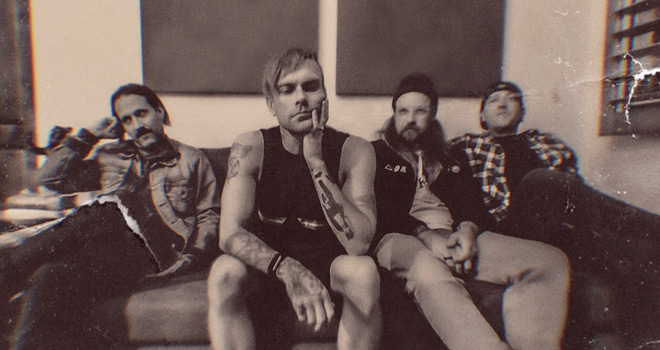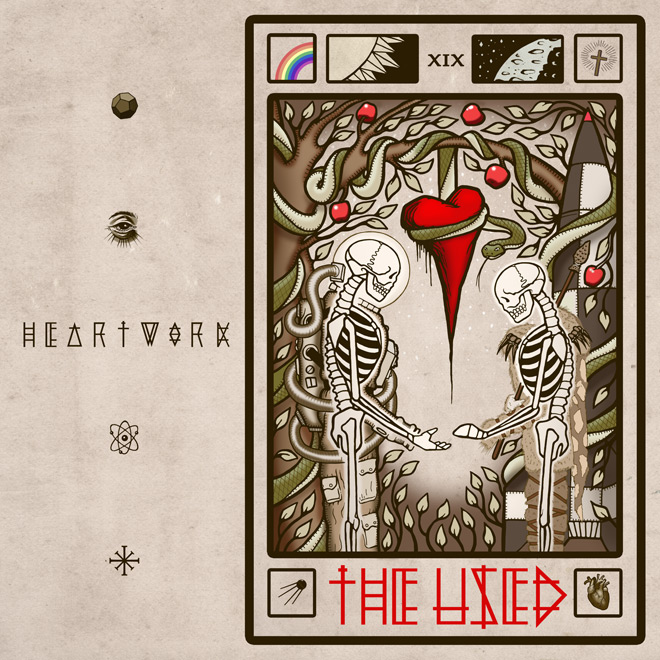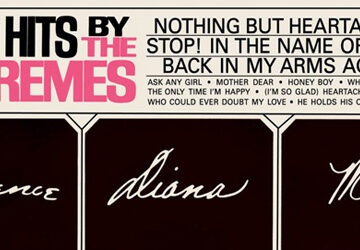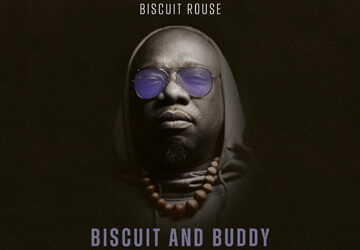
Pardon the pun, but the band’s seventh album, 2017’s The Canyon, went deep, which is no shock coming from these Emo/Screamo rockers who have always worn their hearts on their dapper sleeves. Spitting sharp objects off the surface of his poetic tongue, Frontman Bert McCracken has served as the Jim Morrison of his collective for nearly two decades now. With seven impressive and much loved discs in their oeuvre—including their 2002 eponymous debut, 2004’s In Love and Death, 2009’s Artwork, and 2014’s Imaginary Enemy—The Used has built a name that is synonymous with consistency, exceptional musicianship, and heart-wrenching poetry.
Therefore, it’s no shock that for their eighth full-length, the aforementioned Heartwork, The Used—Vocalist Bert McCracken, Bassist Jepha, Drummer Dan Whitesides, and, newest member, Guitarist Joey Bradford—are glaring into the abyss of 2020 as they flaunt inspiration from across musical genres. This is done with a finesse that sees the quartet evolving their sound to something affected by our modern times, but still very much anchored in the sound that we know and love. It’s also no surprise that literary allusions abound throughout the 16 tracks, a collection that was produced by longtime collaborator and friend, John Feldmann (blink-182, Good Charlotte).
Heartwork kicks off to the catchy riffs of “Paradise Lost, a poem by John Milton.” Apropos of its title, the track takes much of its inspiration from Milton’s 1667 epic poem about the biblical Fall of Man. In this instance, amidst a punky groove, McCracken explores his own struggles to “shake the shadow” that follows him and turns him blue and yellow. It’s this interplay of the personal amid the literary that forms much of the core of Heartwork, allowing the talented vocalist and lyricist to doff his figurative hat to his literary heroes while exploring his personal manuscript.
Contrasting catchy choruses with frustrated, frenetic verses, they make an even more blunt statement with “Blow Me.” Exploding into the intentionally misleading double entendre of the track’s title, they bring Fever 333 Vocalist Jason Aalon Butler into the fold for a rocking collaboration. Next up, no, you do not need to adjust your headphones: “Big, Wanna Be” (grammar is important, folks!) cuts in and out as it builds into another play on words cushioned in synth atmospherics. Here, McCracken taps into his inner Sisyphus, endlessly battling uphill—or is it all a political allusion? You make the call.
With echoes back to their older material, the rawness of “Bloody Nose” is a moment to collect our thoughts before they tease us with the initial delicacy of “Wow, I Hate This Song.” That is, before the foursome detonate into a playful juxtaposition of sweet sonics dancing beside harsh condemnation of the horrible earworms (“Everything that’s on the radio makes me wanna fucking bash my skull”) that you hate to love, and the emotional toll that they can wreck when they conjure thoughts of the past.
At one minute in duration, the gossamer atmospherics of “My Cocoon” serve as a palate cleanser before the band dive into “Cathedral Bell.” Suggestive of the latest EDM offering, the track blends electronics and heavily thumping bass with McCracken’s unique vocals as he cages a self-imposed silence into his poetic words. For The Used, it’s a divergence, but it works splendidly and shows the group’s ability to attack all forms of artwork (or heartwork, if you will) without crafting self-imposed boundaries.
It’s The Used x Danny Elfman in the very first moments of “1984 (infinite jest),” a bizarre journey through a zillion cinematic sounds that find influence in authors George Orwell and David Foster Wallace, but remain, as always, directly linked to the vocalist. In fact, there are moments that sound similar to the In Love and Death-era of the band, and even a “black parade” reference that is apt to make some of the My Chemical Romance geeks implode with glee.
Next, they explore a lulling nostalgia before turning everything upside down in the epic “Gravity’s Rainbow.” Sharing a title with the 1973 Thomas Pynchon novel, this might just be the most radio-ready song on the album. (But, wow, we don’t hate this song!) Then, utilizing some more EDM influences and getting funky (that bass!), “Clean Cut Heals” sees a bell-bottom clad McCracken rolling the dice beneath a Disco ball. Does it sound insane? Maybe, but it works and creates a new facet of the quartet’s musical identity.
At roughly a minute and a half, album namesake “Heartwork” pairs an electronic backbone with McCracken spitting literal poetic rage at the extinction of kindness. Meanwhile, with waves pulsing against the shores, a shipwrecked heart attempts to crawl through the sand to safety in “The Lighthouse.” Amid this perilous seascape, blink-182’s Mark Hoppus offers saccharine sweet pre-choruses that allow McCracken to step in with rays of hope.
Another homage to the band’s musical past, “Obvious Blasé,” featuring Hoppus’ blink-182 bandmate Travis Barker on drums, weaves an infectious rocker. If you’re old-school and looking for the traditional The Used feel, this is the song for you! For those that are willing to embrace the here and now, we would like to introduce you to “The Lottery.” Stepping in to obliterate its predecessor’s sweet melodies, the quartet ignite their torches and gather in a circle for the Shirley Jackson inspired rocker. Beartooth’s Caleb Shomo joins the ritualistic fracas as they draw metaphoric comparisons between the classic tale and today’s mindless conformity and submission.
As the lengthy collection begins to approach its finale, groovy riffs race throughout the core of “Darkness Bleeds, FOTF,” before giving way to a calming piano bridge. Ultimately, this provides the perfect segue for the glittering “To Feel Something,” a desperate attempt to transcend the apathy. A beautifully moving and blunt confession, here the delicate confession evolves into frustrated, tortured howls as The Used closes the curtains on another collection.
Heartwork explores the many facets of being human in 2020, from struggling against apathetic numbness to feeling like a piece of cattle round up for the slaughter. Because of this, there’s a dramatic, often cinematic feel to the stories throughout, as though McCracken is drawing back a shade and allowing his fellow Punks to glance inside his chest and mind. Combining literary references from cherished authors, homages to the foursome’s earlier work, and moments crafted to get an intentional reaction, the vocalist, along with his exceptionally talented bandmates, offer something that feels bigger than any one of us.
A culmination of everything that has come before, Heartwork draws from a zillion moments in time to place a spotlight onto the now. Not so much the socio-political times, but more their effect on us as individuals; the influence of the world’s violent noise on our hearts. For this, Cryptic Rock gives Heartwork 5 of 5 stars.





